It can be frustrating to not know what you or your children are reacting to and even more when you do not have a clue if your child is indeed suffering from food intolerances/sensitivities or allergies. Both my children suffered for many years with gut-related issues such as histamine intolerance, salicylate intolerance, glutamate intolerance, leaky gut and dysbiosis. This was un-diagnosed for many years. On one occasion my son’s calprotectin count (which is a gut related inflammatory marker) had risen past 550 (normal range is <50). According to research repeated exposure to some of the harmful foods caused chronic inflammation (1, 2), auto-immune conditions and leaky gut.
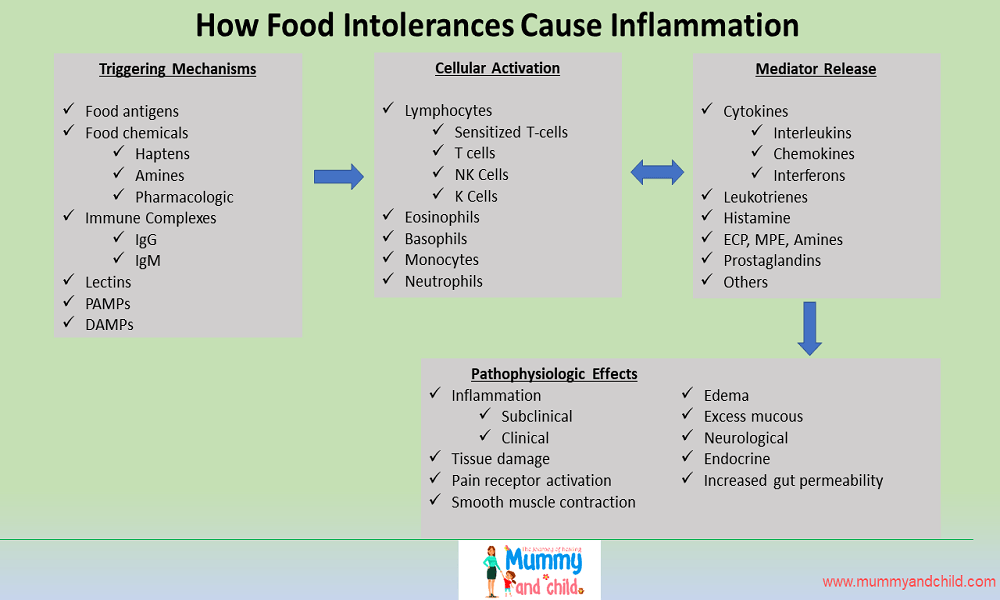
If you have gut-related issues or suspect an allergy or sensitivity it is important to remove the harmful food/s from your diet. There are 3 categories of diet-induced inflammation, with food intolerances being the most prevalent
- Food allergies
- Auto immune disease
- Food intolerances or sensitivities
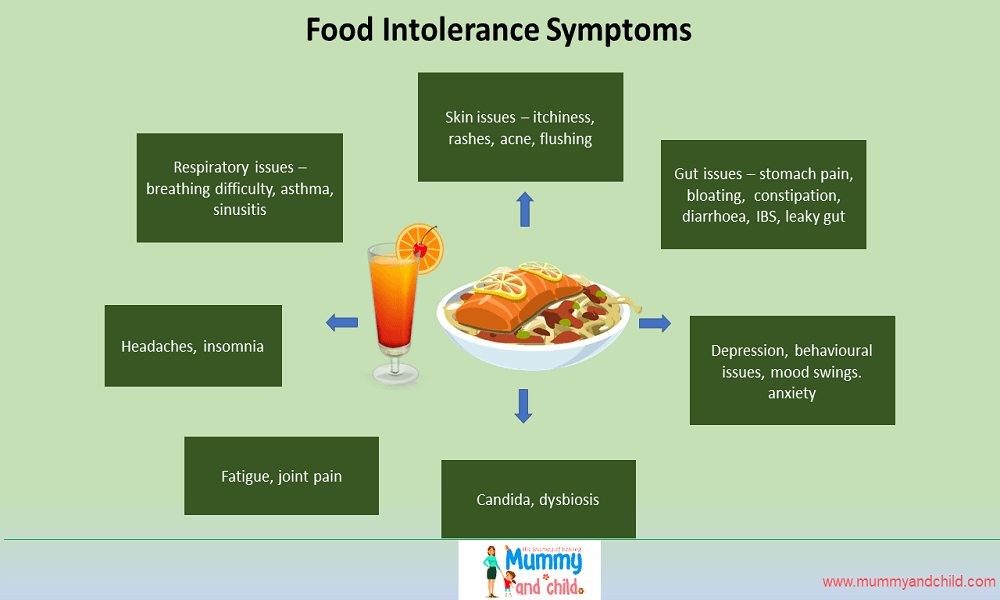
Food intolerance can manifest in many ways and can give rise to a variety of symptoms – some being quite mysterious. Common intolerances are to foods and chemicals such as dairy, lactose, gluten, corn, amines and salicylates.
Food Allergy Vs Food Intolerance
It is useful to delve a bit into IgA, IgE and IgG immunoglobins or antibodies in our body. These antibodies form part of our immune system and the body produces them in response to certain foods, chemicals, dust, pollen or dander. Essentially their function is to mount an immune response to fight against “foreign” invaders.
An allergy is due to an abnormal immune system response due to allergens. These allergens cause the immune system (in particular white blood cells) to produce IgE antibodies that attach themselves to mast cells. When the allergen combines with IgE immunoglobins, the body releases a high amount of histamine and other chemicals causing allergy symptoms. This can results in symptoms from itching, shortness of breath to life-threatening anaphylaxis.
On the other hand an intolerance is a delayed reaction that may take up to 72 hours to results in symptoms and are non-life threatening. There are some important differences though between an allergy and a food sensitivity.
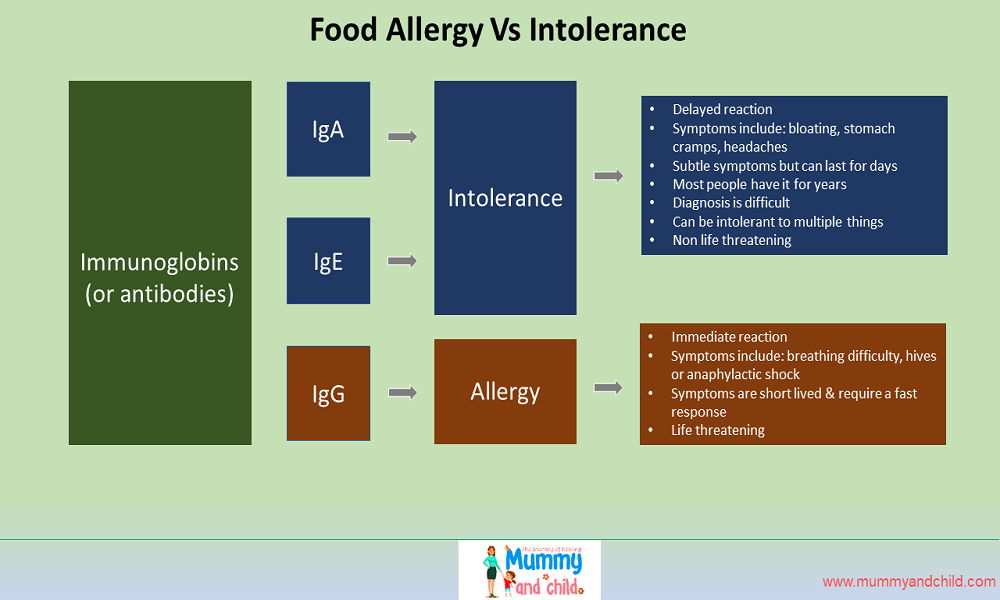
Allergy Testing
Allergy testing is used to determine the foods that you are allergic to so that a treatment plan can be developed to manage the condition. Skin prick testing and allergy blood tests are the most common forms of testing in the market.
Skin prick test – The test begins with a positive histamine control test and a negative control test. The positive test is used to determine how the skin reacts to histamine, and the negative control test generally involves applying saline (which is a substance that does not contain any allergens). Ideally, the person should not react to the saline control. An itchy weal will generally develop at the histamine control within about 15 minutes.
The actual test involves placing a small amount of the allergens that will be tested on the skin and then pricking the skin lightly with a small needle. If the person is allergic to the substance a small itchy weal will appear within 15 to 20 minutes. Skin prick tests are generally well tolerated even by children. If there is swelling or itchiness after the testing, an antihistamine such as Zyrtec is given and a cold compress is applied.
IMPORTANT – Skin prick testing should only be performed by a qualified health professional. Generally, for children aged 2 years or below, it is recommended to be done at a children’s hospital. Such testing should NEVER be performed at home.
Blood test – The traditional method was called RAST (radioallergosorbent test), it is now widely replaced with newer IgE specific immunoassay methods. If the allergen specific IgE result is positive, it indicates the patient is likely to have an allergy. However, the amount of IgE present does not necessarily indicate the potential severity of a reaction. In order to interpret the results, a patient’s clinical history and a food diary needs to be closely analysed.
Food Intolerance Testing
Unlike allergies (where the symptoms are immediate) food intolerance or sensitivit symptoms can take up to 72 hours to show up. During which time one would have consumed many other foods or come into contact with many other chemicals, therefore making it extremely difficult to diagnose. Again, unlike with allergies, a person is typically intolerant to multiple foods and chemicals, which makes it a lot harder to find out the offending foods using an elimination diet.
When my functional practitioner introduced food sensitivity testing to us my son was extremely ill and he was basically reacting to most of the foods he ate. The good news is, the technology has evolved and nowadays there are tests available that can be easily accessed. Such testing is not endorsed by many western medical practitioners.
If you suspect that you or your child could be having food intolerances I would suggest getting a food intolerance test done. The question then is, what is the right test. MRT, ALCAT, IgG… well, things start getting quite complex.
Here I will try to explain the mainstream testing methods available with their pros and cons. It’s important to distinguish between the marketing hype, and the genuine desire to get to the root cause. Personally, I have used both MRT and ALCAT food intolerance or sensitivity tests to identify the foods that were causing issues with my kids. I can’t say they were always 100% accurate but they have helped me immensely, to identify the majority of the foods that they were intolerant to and follow the right dietary regimen. I always try to correlate test results with the actual symptoms that I capture in a food diary. This has helped me get a full picture of their health condition.
It is important to understand that by continuing to consume foods that you are intolerant to, you may create other complications such as leaky gut, IBS and acute gut inflammation and the cycle will continue. Until you start addressing the root causes (such as leaky gut, dysbiosis, SIBO or methylation/detoxification pathways) you will need to be on a guided diet. Once you have treated the underlying root causes (with the right diet and lifestyle changes) you can then start to re-introduce foods and eventually eat a wide variety
There are 2 main types of tests – ALCAT and MRT. Both methods were invented and patented by the same person Dr. Mark Pasula.
ALCAT (Antigen Leukocyte Cellular Antibody Test) is a simple blood test that can be used to identify food and other factors that induce innate immune system activation. It is measured based on the changes in size and volume of the white blood cells after exposure to foods, mould, additives, chemicals and dyes. ALCAT does not test for IgE type of allergies. It came out initially in the mid 1980’s. The system has proven to be reproducible with amazing clinical outcomes. Fell and Brostoff (5) reported an 83.4% correlation whilst Hoj et al reported a 96% correlation of ALCAT and double oral challenges with foods (4).
ALCAT Key Points
- Unique method for testing a patient’s response to foods, chemicals, and moulds
- Measures delayed reaction over several hours after exposure (non IgE)
- Measures changes in size and volume of white blood cells
Indicates cellular inflammatory response
MRT (Mediator Release Test) is a patented “end-point” test that is capable of measuring mediator release through precise measurement of changes to the liquid/solids ratio of a blood sample after it has been incubated with a food, chemical or additive particle. Compared to other methods MRT is capable of detecting the outcome of all non IgE mediated reactions using an innovative approach. Based on a study by Kaczmarski et al it was found that MRT testing had a 94.5% sensitivity and 91.7% accuracy (5).
A very important aspect of MRT is that it’s also able to identify the foods that have the lowest degree of reaction (i.e. those that can be tolerated). These are the foods that can be consumed. With this approach it is much easier to come up with a healthy diet plan.
MRT Key Points
- Provides a functional measure of sensitivity inflammatory response
- As it is an end-point test MRT can account for a wide range of triggering mechanisms involved in sensitivity reactions
- Measures reaction to foods, chemicals and moulds
- Reliably quantify the degree of the inflammatory response as it is a three-dimensional testing method
Order Your Own Lab Tests
Did you know you can order your own tests? TrueHealthLabs offers comprehensive functional testing without the hassle.
This is How it Works
- You order the test kit
- Your kit is sent to you at your home via UPS or Fedex. It includes the following:
- Prepaid UPS shipping pack with pickup service
- Requisition form
- Shipping collection and instructions
- You get your blood drawn from a collection centre and send your kit to the lab in the prepaid UPS mailer.
- Your blood sample is tested
- You’ll receive a lab report explaining your test results
- If required, you call and set up a phone consultation with a TrueHealthLabs functional doctor to discuss your lab results and answer any specific questions you may have. (I recommend this option)
Order Your Allergy Test Now (by clicking on the links below you get the best price)
IgE Food Allergy Basic Test (USA Only – Excl NY)
IgE Food Allergy Advanced Test ** Popular** (USA Only – Excl. NY)
IgE Food Allergy Basic Test (New York Only)
IgE Food Allergy Basic Test (Canada Only)
IgE Food Allergy Basic Test (Other International)
Order Your Intolerance/Sensitivity (MRT) Test Now (by clicking on the links below you get the best price)
MRT Food Sensitivity 85 Test (USA Only – Excl NY)
MRT Food Sensitivity 170 Test ** Popular ** (USA Only – Excl NY)
MRT Food Sensitivity 170 Test (Canada Only)
MRT Food Sensitivity 170 Test (Europe Only)
Getting to Know Your Results
Book a 1:1 consultation with a functional doctor to review your results
Sample MRT Report
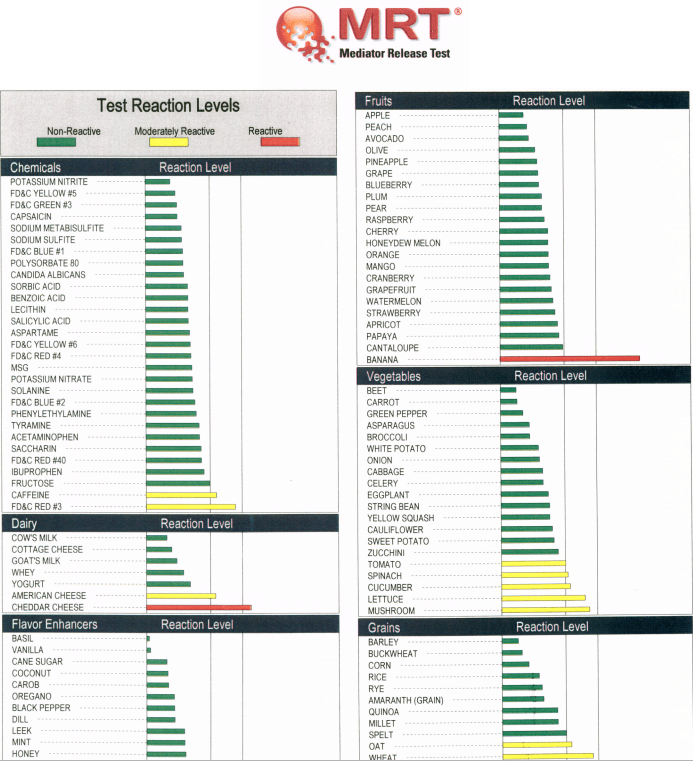
About TrueHealthLabs
TrueHealthLabs was founded by Dr. Brady Hurst with the purpose of providing the public with a fast, convenient, affordable, and confidential method for ordering laboratory tests. Through their relationships with CLIA certified laboratories, customers can have their specimens collected at one of our over 2,000 convenient locations throughout the United States and other countries in the world. TrueHealthLabs is dedicated to helping those who have decided to take control of their own healthcare. It serves as a scorecard for individuals to monitor their health and adjust their lifestyles to live a healthy and productive life
Checkout TrueHealthLab reviews
If you are struggling with food intolerances, allergies, SIBO or other digestive problems, there are products that can help with symptom relief. I know it can be frustrating but there are treatment protocols and supplements which can really help.
I have designed this product guide to equip you with the best and most effective supplements you can buy for treatment as well as symptom relief. This list has been compiled through my own experience as well as working together with trusted and experienced practitioners.
You can check out my recommended supplement guide here.
Here are some excellent growth mindset quotes for kids
Excellent tips for raising grateful kids
7 Tips for raising strong and resilient kids
References
1. https://www.foodintol.com/latest-news/16-medical-research-news/5-inflammatory-disease-and-food-intolerance
2. Inflammation and Food Sensitivities — Successful Treatment Begins With Patient-Centered Care by Jan Patenaude, RD, CLT, Today’s Dietitian
Vol. 13 No. 11 P. 18
3. Brostoff, Jonathan., Fell, Peter J., Pasula, Mark J. High Correlation of The ALCAT Test Results With Double Blind Challenge (DBC) in Food Sensitivity. Presented at the 45th Annual Congress of the American College of Allergy and Immunology, Los Angeles, CA, November 12-16, 1988
4. Hoj L. 1996, Diagnostic Value of ALCAT Test in Intolerance to Food Additives Compared with Double Blind Plaebo Controlled Oral Challenges. J Allerg Clin. Immun. No 1, part 3
5. Kaczmarski Maciej, Pasula Mark, Sawicka Ewa, Werpachowska Irena. MRT Test – New Generation of Tests for Food Hypersensitivity in Children and Adults. Children Clinic, University of Bialystok Medical School. Signet Diagnostic Corporation


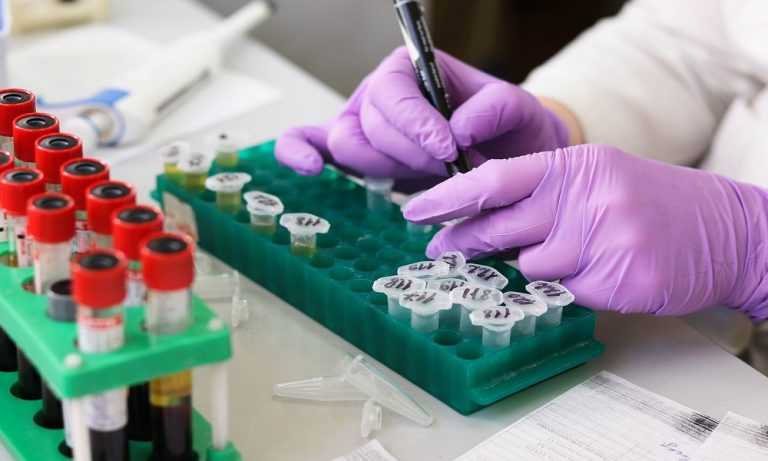
8 Comments
Hi tamara, it is very nice post. Very thoughtfully written.
Thanks, glad you liked it
Thanks for pointing out that an ALCAT is a simple blood test that can be used to identify food and other factors that induce innate immune system activation. I am thinking about getting an ALCAT allergy test kit because I am nervous that my daughter by being having a reaction to some foods. I think that that test would help me narrow everything down so that we can start figuring out what to avoid in more detail.
Yes it is. I used it with my kids as well for the same reason. I then tried to correlate those findings with a food diary that I used to maintain. Eventually, the important thing is to find the root cause. I waited many years thinking my kids will simply “get over” their intolerances but it did not happen that way
Thanks for the information on the different allergen testing methods, such as how skin pricking checks for reactions to histamine and usually saline control to check if anything shows up within 15 to 20 minutes. I also like that you mention how even children generally tolerate this option, which would be useful to find any problems early on. When choosing a method to use, it would probably be a good idea to talk to a professional that specializes in allergen testing so you can discuss your situation and ask questions to figure out which option will work best to help you find any reactions and discuss what would be best for your condition.
My kid is getting a little older and we’re giving her more solid foods, so I wondered if I should get her tested for allergies since my husband and I both have a few food allergies. I didn’t know a food intolerance has symptoms that occur within 72 hours and aren’t as serious as allergies. I wouldn’t want anything to happen to my daughter, so I’ll look into clinics where we can do an allergy test, thanks to this post!
After reading your post I wanted to order the ALcat test for my daughter who is almost 4 but they told me she needs to be 18 or older to do the test. Can you please explain how you got yours? Thank you.
We got the test done in Australia through Nutripath https://www.nutripath.com.au/product/alcat-tests/